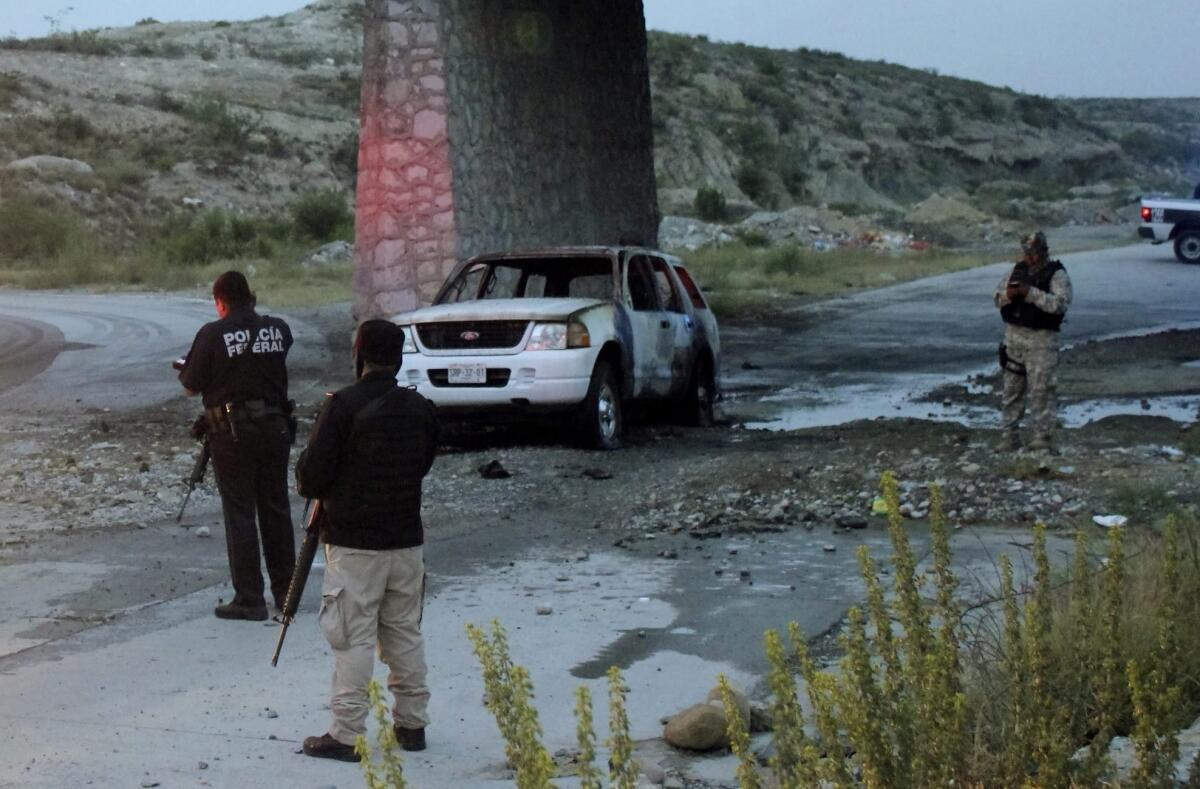In Mexico, dozens fall to new violence across 4 troubled states

- Share via
MEXICO CITY — Despite some recent promising homicide statistics, violence continues to rage in regions of Mexico plagued by drug gangs and organized crime, as evidenced by dozens of killings spread over four states in the last five days.
The incidents, which include a deadly ambush on federal police and the slaying of two people in a medical clinic by gunmen disguised as doctors, demonstrate how much work President Enrique Peña Nieto has yet to do to convince his countrymen that Mexico is becoming safer.
In June, six months after Peña Nieto’s swearing-in, his government boasted that in both February and May the number of homicides connected to federal crimes fell below 1,000 per month. (Drug and organized crime cases are usually under federal jurisdiction in Mexico.)
Statistics for June showed that the symbolically important 1,000 figure again had not been breached, with 869 homicides reported by the Interior Ministry. Before February, it had been surpassed every month for three straight years.
But the seemingly unrelated acts of violence in recent days is a rebuke to anyone who thinks the country’s problems are solved.
The ambush of the federal officers occurred Thursday in the southwestern state of Michoacan, on a highway near the border with the state of Guerrero. Three officers were slain and six were wounded, according to the state prosecutor’s office.
A day later, the bodies of two men and two women were found hanging at the entrance to the Michoacan community of El Limon de la Luna, in a municipality called Buenavista Tomatlan. The farming region, in the western portion of Michoacan known as the Tierra Caliente (Hot Land), has been one of the most unstable in Mexico in recent months, with vigilante groups taking up arms to defend themselves from a narcotics cartel called the Knights Templar. Peña Nieto sent the military to the region in May in an effort to restore order.
There is a concern that some of the vigilante groups have been infiltrated by members of a rival drug cartel. On Monday, according to media and government reports, a group of protesters in the western Michoacan city of Los Reyes marched on city hall, reportedly accompanied by members of a self-defense group who planned to kick out the municipal police, whom they suspected of supporting the Knights Templar.
The news agency Notimex reported that the protesters were fired on by members of a second group whose identity is unknown. Mexican papers Monday reported that as many as five people were killed in the attack. The state’s governor confirmed Monday via Twitter that one woman had been killed.
In the neighboring state of Jalisco, officials said seven people were slain in a 12-hour period Saturday in greater Guadalajara, Mexico’s second-largest metropolitan area and the longtime home of a number of narco bosses. Among the victims, officials said, were a state police officer and a municipal police officer from Puerto Vallarta.
In the state of Durango, to Jalisco’s north, eight people were slain Friday in three municipalities. The next day, three burned bodies were discovered in a home in the city of Lerdo.
In the border state of Coahuila, 18 people were slain in various incidents in the capital, Saltillo, between Friday and Sunday. Gunmen who dressed as doctors carried out an attack in a medical clinic in Torreon, state officials said.
Last week, the leader of the notorious Zetas drug cartel, Angel Treviño Morales, was captured by federal officials, and many had speculated that a wave of bloodshed would follow. But it is not clear if any of the recent events are connected to his detention.
In addition to army and navy troops who have been fighting the drug cartels since 2006, the federal government next year plans to introduce 4,000 to 5,000 members of a new gendarmerie, a special police force with military training that Peña Nieto promised during his campaign.
“We are defining their functions, where they are going to be and what they are going to do,” said Manuel Mondragon y Kalb, the national security commissioner, in a television interview this month.
ALSO:
Royal baby born: Cheers outside Buckingham Palace
Pope Francis faces high expectations in Brazil. Can he deliver?
U.S.-Australia war games bomb Great Barrier Reef, stirring uproar
More to Read
Sign up for Essential California
The most important California stories and recommendations in your inbox every morning.
You may occasionally receive promotional content from the Los Angeles Times.










